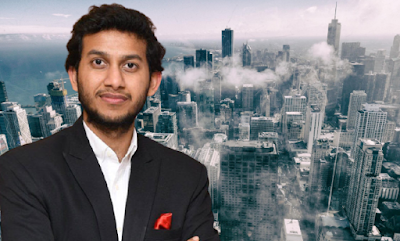 |
| Ratish Agarwal a Youth Icon |
The story of Ratish Kumar, who sold a mobile SIM at the age of 13 in the slums of a
remote Indian state, is both astonishing and inspiring. Became one of the world's
leading personalities. Ivanka Trump, daughter of US President Donald Trump, has
expressed satisfaction over the efforts of Ratish Agrawal, who allocated OU
hotels in the US for free accommodation and other medical needs during the
Corona outbreak. At the age of 19, Agarwal traveled to various cities in India,
including Delhi, Goa, Kerala, and Rajasthan. During this 3-month journey, he
gained experience of staying in various hotels. They lived in filthy hotels
with cracked bed sheets, cockroaches in the rooms, lizards hanging from the
ceiling, yellow paint sticking out of the walls, improperly closed doors, water
falling from the wash taps, and buckets filled with water.
He
also had similar experiences. "During this trip, I learned a lot from
these experiences. I felt that by adopting better standards in the hotel
industry, great success can be achieved in this business. To put this idea into
practice, he started in 2013," says Agarwal. Opened the first OYO Hotel in Gurgaon with high-quality blankets, thick mattresses, flat-screen TVs,
and hot water facilities. In the first month, the rush of the hotel occupants increased from 18% to 90%. Today, Agarwal is 26 years old and his company is
worth 10 billion dollars, of which Softbank Group Corporation has invested 1.
1.6 billion dollars over the past two years. Unlike other large hotel groups,
Ovi Hotel does not own its property, providing capital and hotel management
training to owners who pay Agarwal 20% of their income in exchange for using
the group's name. The group provides proprietary data mining technology that
helps hotels increase revenue. Ovi is currently the world's second-largest group with 1.2 million rooms in 44,000 hotels on four continents and is
expected to overtake Marriott Hotels China this year.
1 How
did Ratish Agrawal develop so quickly?
If
Agarwal told Bloomberg that a year ago we were limited to India and were
starting operations in China, but now his group is adding 70 to 80 hotels every
day, he hopes to add 100,000 new ones in the next 30 days. The rooms are about to
open, and Ovi has about 200 properties in 35 US cities.
According
to Agarwal "We started our original business in India, but we created a
product that can be given to other countries in the world. We design interiors
faster and better than other companies, we work more efficiently through
initiatives such as the housekeeping app that quickly cleans the room and
increases customer confidence in us. Higher profits depend on the demand for
rooms. Furthermore, he said that you can no longer ignore the sign of
Oyo Hotel in the second, third, and fourth-tier cities of China. When you drive
in Jakarta, London, or beyond in Dallas, Houston, and Las Vegas, you often see
signs of the Oviedo Hotel.
2
What
is Agrawal's business model?
Ratish
Agarwal is happy with the success of his business model, saying that 99% of the
owners in the group have been associated with him since the beginning of the
business. In India we spend about $500 on renovating a room, in China, it is 5,500 small cities, in big cities, it is 50 750 and in the United States, it is $1,000
to renovate a room. We cover these costs worldwide within an average of 6
months. Before designing the interior, we try to figure out how to make the best design at a low cost. Portraits of Marilyn Monroe, for example, have
increased room income by an average of 10 to 11 percent. Consumers rate such
hotels as boutiques.
When
we realized that a portrait of Marilyn Monroe on the wall of a hotel room in
Texas had increased revenue by 25%, we began to use this model elsewhere. About
50% of our hotels in India offer full service, for example, they also have room
service. Assume that hotels with such services are available in India for $25
per room per night, we do not have full-service hotels available outside India
at this price. In our case, when a guest goes to a full-service hotel, the
lobby staff knows that the guest had ordered pizza in the room on the previous
visit and will immediately ask if the guest wants pizza. If the hotel reception
staff sells additional services, they are given a discount. Our OVO Training
Institute trains employees in this regard. We have so far created 300,000 jobs
for housekeeping, front desk, maintenance, and other matters.
3
How
did Ratish Agarwal come to business?
Ratish Agarwal describes the ups and downs of his life as he grew up in
the region of Rayagada in the eastern Indian state of Odisha. Few people know
about this area, where more than 70% of the population live below the poverty
line.
According to Agarwal
when he was 13, he started selling mobile SIMs in slums of India because big
companies didn't do that in such a small area. My father ran a retail store, we
are four brothers, I am the youngest. One of my brothers is an engineer while
the other two have a master's degree in business administration. I was expelled
from college. My parents thought that their three sons were worthy while I was
considered a black sheep.
4
How
does Agarwal, who is so busy, make time for his personal life?
Agarwal says he spends the entire month traveling to India, China, and
the United States. If there is one thing that is permanent with them, other
than the Oyo group, it is their dog, Lisa. They also do some shopping for Lisa.
My Parents see two Oviedo hotels from the balcony of their house, so they are
no longer worried about me.
